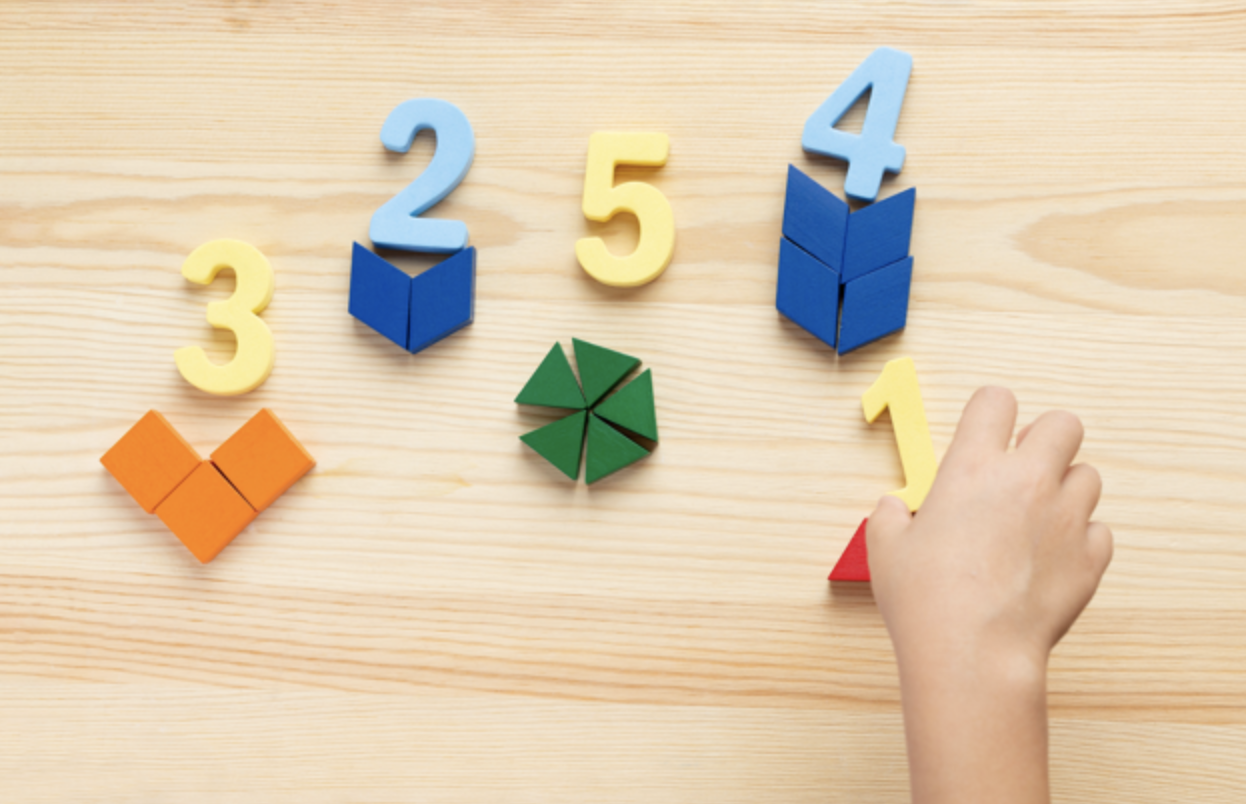
Mastering core subjects in education begins with a strong foundation. By counting beads and exploring geometric shapes and patterns, the Montessori approach to math can help young learners develop a deep understanding of numbers and foster a lifelong love for mathematics.
In Montessori math education, abstract concepts become tangible, hands-on experiences that children can grasp. In this article, we’ll divulge some of the secrets behind Montessori’s unique methodology that empowers young minds to grasp mathematical concepts through interactive, engaging activities.
Read on to discover a world where learning math becomes an immersive adventure that unlocks the potential of every child’s numerical prowess.
The Montessori Approach to Math Education
Developed by Dr. Maria Montessori in the early twentieth century, this innovative pedagogy prioritizes hands-on, experiential learning to cultivate a foundational understanding of core math concepts.
In Montessori classrooms, children often engage with specialized learning materials that cater to their developmental stages, allowing them to progress at a natural pace. From concrete manipulatives to abstract problem-solving, the curriculum evolves organically, ensuring a solid foundation in numeracy.
Emphasizing the interconnectedness of mathematical ideas, the Montessori method fosters not only computational skills but also critical thinking and a genuine appreciation for the beauty of numbers.
By encouraging exploration and discovery, Montessori math education nurtures a love for mathematics and instills confidence in young learners to approach numerical challenges with curiosity and competence.
Hands-On Learning Materials in Montessori Math
Montessori classrooms stand apart for their emphasis on hands-on learning materials. In mathematics, learning materials are meticulously designed to foster a tangible understanding of mathematical concepts. These materials, often crafted from natural elements, engage multiple senses, enabling a holistic learning experience.
From the iconic Montessori Golden Beads, which aid in comprehending place value and arithmetic, to the intricately segmented Fraction Circles that visually demystify fractions, each piece serves a purpose in the progression of math comprehension.
Sandpaper Numerals provide a tactile introduction to numerals, enhancing both visual and tactile recognition, and the Constructive Triangles help facilitate the exploration of spatial relationships and math concepts.
These materials align with the Montessori philosophy and encourage self-directed learning that allows children to discover mathematical principles independently. Through these and other hands-on tools, Montessori math classrooms cultivate a profound connection between learners and the abstract world of numbers, making math a vibrant and accessible realm of exploration.
Challenges and Solutions
There are real challenges to engaging young learners with math, including limited attention spans and diverse learning styles. Engaging in activities that incorporate play and hands-on experiences is vital to maintaining interest. Another hurdle lies in the abstract nature of some core math concepts and how to simplify them with relatable examples and visual aids.
Differentiation is key—it is important to recognize individual learning paces and adapt approaches accordingly. Encouraging a positive mindset toward math and avoiding undue pressure helps cultivate a supportive learning environment.
Parental involvement and communication also play a major part in reinforcing math concepts at home. By addressing these challenges with creativity, adaptability, and a holistic perspective, educators can nurture a solid mathematical foundation in young minds.
Tips for Parents: Bringing Montessori Math Home
To support your children on their educational journey, consider incorporating hands-on math materials like counting beads or geometric shapes in your home and encouraging play.
Foster independence by organizing a dedicated math area with accessible materials and allowing children to choose these activities autonomously.
Integrate math with everyday activities like cooking or shopping to introduce practical math concepts in a natural way. This helps emphasize the real-world applications of math, making it relevant and engaging.
Follow your child’s lead by recognizing their unique learning pace and interests. Encourage questions and exploration, and you can seamlessly integrate mathematical learning into your daily lives.
Helpful Learning Solutions for Your Family
Embracing Montessori math at home nurtures a love for learning that extends far beyond the classroom. By infusing daily life with hands-on learning experiences and fostering independent exploration, parents can empower their children to grasp mathematical concepts with joy and confidence.
For those seeking further guidance on implementing Montessori principles, we invite you to connect with Austin Children’s Academy. Our experienced educators are dedicated to supporting your child’s educational journey, ensuring a solid foundation in mathematics that lasts a lifetime.
Contact us today to discover how Montessori math can transform your child’s educational experience.





















